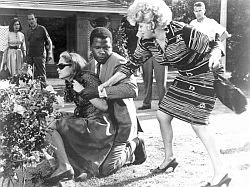I've been enjoying this month's TCM interview series Elvis Mitchell: Under the Influence. The only bad thing about them is that they're too short; it would have been nice to spend a full hour with the interviewees instead of just a half-hour. The first two were with the late Sydney Pollack and Bill Murray; tonight's interview, at 8:00 PM ET and repeated at 10:30 PM, is with Laurence Fishburne. In between, TCM will be showing the 1965 movie A Patch of Blue.
This movie was most likely selected for airing tonight because Laurence Fishburne would have been influenced by the movie's star, Sidney Poitier. To be honest, though, Poitier is only the star because he gets top billing. The real star should be Elizabeth Hartman. She plays Selina, a blind girl in a poor family who's been treated pretty badly by her mother Rose-Ann (played by Shelley Winters, who won her second Oscar for her performance). Rose-Ann treats Selina as little more than hired help, leaving her to spend the entire day alone at her meager job, stringing beads. Selina's wish is to be taken to the park to sit under a tree in the warm sun and string her beads there, but her mother hasn't taught her anything about being independent, so she can only go to the park if someone can take her there in the morning, and then pick her up again in the afternoon.
One day, while Selina is in the park, she's met by white-collar worker Gordon Ralfe (that's Poitier), who immediately sees that there's something lousy with Selina's upbringing. He takes an interest in her well-being, showing her such new experiences as pineapple juice and shopping (pick oranges from the top of the pile!), and along the way, Selina develops a crush on Gordon.  This crush presents a problem, partly because Gordon doesn't feel the same toward Selina. He's concerned about her, and likes her as a friend, but it's not really love he feels. Second, there's the problem that Gordon is [whispers:] black. Rose-Ann is racist enough to be horrified with the idea of interracial dating, but it's not just the whites who have a problem with the relationship; Gordon's brother takes the view that because whites have been racist towards blacks for so long, Gordon shouldn't be wasting his time trying to help a blind white girl. I don't wish to give away the ending, other than to say that everybody lives, if not ever after, and if not necessarily happily; the story ends both with a decided not of poignancy, and with some optimism for the future.
This crush presents a problem, partly because Gordon doesn't feel the same toward Selina. He's concerned about her, and likes her as a friend, but it's not really love he feels. Second, there's the problem that Gordon is [whispers:] black. Rose-Ann is racist enough to be horrified with the idea of interracial dating, but it's not just the whites who have a problem with the relationship; Gordon's brother takes the view that because whites have been racist towards blacks for so long, Gordon shouldn't be wasting his time trying to help a blind white girl. I don't wish to give away the ending, other than to say that everybody lives, if not ever after, and if not necessarily happily; the story ends both with a decided not of poignancy, and with some optimism for the future.
If there's anything wrong with A Patch of Blue, it might be that Poitier's Gordon Ralfe is just a bit too perfect. It's clear that he's supposed to be the good guy, and in so doing, almost fails to mention that he too would have the same character flaws all of us have. But for the most part, A Patch of Blue is not only high-quality filmmaking; it's intelligent, too. The movie has things to say about the issues of race and class, but doesn't try to bludgeon those points home, and also presents plausible and easily understandable motivations for the positions that those affected by Gordon and Selina's relationship take. Even Rose-Ann has something sympathetic to offer. It helps that the movie is filled with fine portrayals. I've already mentioned Winters' Oscar; the other two leads, Poitier and Hartman also deliver excellent roles. (Hartman was nominated for a Best Actress Oscar, losing to Julie Christie in Darling.) Ivan Dixon is realistic as the more militant brother of Gordon Ralfe. Veteran character actor Wallace Ford makes his final movie appearance as Selina's father; 14 years earlier he played Winters' father in He Ran All The Way. Another veteran character actor who shows up here is John Qualen, playing the part of Selina's boss, Mr. Faber. A Patch of Blue is also available on DVD, and is a fine movie, not to be missed.
2026 Oscar Nominated Shorts
6 hours ago

No comments:
Post a Comment